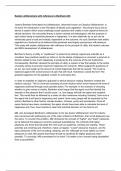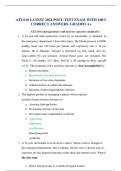Explain utilitarianism with reference to Bentham (20)
Jeremy Bentham formulated Act Utilitarianism, otherwise known as Classical Utilitarianism, in
his book 'An Introduction to the Principles of Morals and Legislation'. His primary focus was to
devise a system which would challenge social injustices and create a more objective theory for
ethical decisions. His concluded theory is action-centred and teleological, with the purpose of
each action being to maximise pleasure or happiness. It is also relativistic as no act can be
intrinsically good or bad and instead, dependant on the outcome. As such, Bentham was widely
regarded as a hedonist as he believed that goodness was largely synonymous with pleasure.
This essay will explain utilitarianism with reference to the principle of utility, the hedonic calculus
and Mill's development of utilitarianism.
Bentham's theory of utility or "usefulness" is aimed to be rational, logical and scientific as it
considers how practical (useful) an action is. As the desire of pleasure is universal, a good act is
directly related to how much happiness is produced by the outcome of the act (hedonism).
Consequently, Bentham devised the principle of utility; a system of law that applies to the whole
of society aiming to promote maximum happiness for everyone. When judging the goodness of
an act, we must weigh up the amount of overall happiness that will be caused. This must be
balanced against the overall amount of pain that will result. Hutcheson coined the term "the
greatest happiness for the greatest number to summarise this.
In order to establish an objective approach to ethical decision making, Bentham created the
hedonic calculus. This is a formula consisting of seven factors which would measure the level of
happiness achieved through each possible action. For example, in the scenario of choosing
whether to give money to charity, Bentham would argue that the agent must first identify the
intensity of the pleasure that it would cause. I.e. how happy will both the agent and recipient
feel. This would then be followed by a series of other measures including 'certainty' (how sure is
the agent that it will lead to happiness) and 'extent' (how many people will be impacted by this
action). Bentham's other factors include duration, richness, purity and remoteness. Once all
seven factors have been considered, the agent should have been able to calculate the level of
happiness and, thus, have reached a clear and practical decision on how best to act.
Mill, who developed Bentham's utilitarianism in his two books 'Utilitarianism 'and 'On Liberty'.
was concerned with addressing one of the main criticisms of Bentham- that not all pleasures are
the same. To counter this problem, Mill introduces the concept of "higher" and "lower" pleasures
as he believed that pleasure could be analysed quantitatively. He contends that higher
pleasures are those that stimulate the mind such as academia, working and reading. These
activities are enriching and, therefore, make us happier. "Lower" pleasures however, are the
basic pleasures of life such as eating, sleeping, sex etc. Although we must satisfy our lower
pleasures to exist, Mill asserts that these should be sacrificed for higher pleasures when
possible. To conclude, Mill summarised in his book "it is better to be a human being dissatisfied
than a pig satisfied."
Jeremy Bentham formulated Act Utilitarianism, otherwise known as Classical Utilitarianism, in
his book 'An Introduction to the Principles of Morals and Legislation'. His primary focus was to
devise a system which would challenge social injustices and create a more objective theory for
ethical decisions. His concluded theory is action-centred and teleological, with the purpose of
each action being to maximise pleasure or happiness. It is also relativistic as no act can be
intrinsically good or bad and instead, dependant on the outcome. As such, Bentham was widely
regarded as a hedonist as he believed that goodness was largely synonymous with pleasure.
This essay will explain utilitarianism with reference to the principle of utility, the hedonic calculus
and Mill's development of utilitarianism.
Bentham's theory of utility or "usefulness" is aimed to be rational, logical and scientific as it
considers how practical (useful) an action is. As the desire of pleasure is universal, a good act is
directly related to how much happiness is produced by the outcome of the act (hedonism).
Consequently, Bentham devised the principle of utility; a system of law that applies to the whole
of society aiming to promote maximum happiness for everyone. When judging the goodness of
an act, we must weigh up the amount of overall happiness that will be caused. This must be
balanced against the overall amount of pain that will result. Hutcheson coined the term "the
greatest happiness for the greatest number to summarise this.
In order to establish an objective approach to ethical decision making, Bentham created the
hedonic calculus. This is a formula consisting of seven factors which would measure the level of
happiness achieved through each possible action. For example, in the scenario of choosing
whether to give money to charity, Bentham would argue that the agent must first identify the
intensity of the pleasure that it would cause. I.e. how happy will both the agent and recipient
feel. This would then be followed by a series of other measures including 'certainty' (how sure is
the agent that it will lead to happiness) and 'extent' (how many people will be impacted by this
action). Bentham's other factors include duration, richness, purity and remoteness. Once all
seven factors have been considered, the agent should have been able to calculate the level of
happiness and, thus, have reached a clear and practical decision on how best to act.
Mill, who developed Bentham's utilitarianism in his two books 'Utilitarianism 'and 'On Liberty'.
was concerned with addressing one of the main criticisms of Bentham- that not all pleasures are
the same. To counter this problem, Mill introduces the concept of "higher" and "lower" pleasures
as he believed that pleasure could be analysed quantitatively. He contends that higher
pleasures are those that stimulate the mind such as academia, working and reading. These
activities are enriching and, therefore, make us happier. "Lower" pleasures however, are the
basic pleasures of life such as eating, sleeping, sex etc. Although we must satisfy our lower
pleasures to exist, Mill asserts that these should be sacrificed for higher pleasures when
possible. To conclude, Mill summarised in his book "it is better to be a human being dissatisfied
than a pig satisfied."











